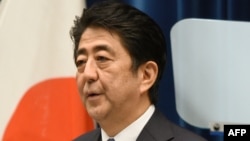Prime Minister Shinzo Abe expressed feelings of “profound grief” and “sincere condolences’ to those who suffered and died from Japan’s past military aggression while making his highly anticipated public statement on the 70th anniversary of the end of World War II.
"Upon the innocent people did our country inflict immeasurable damage and suffering," Abe said.
The prime minister's statement failed to satisfy China and was unlikely to please other regional neighbors, such as South Korea, which repeatedly have called upon Abe to directly and explicitly address the atrocities committed by the Japanese military during its colonization of much of Asia.
A statement posted early Saturday on the Chinese Foreign Ministry website says "Japan should have made an explicit statement on the nature of the war ... rather than being evasive.''
Making amends
Abe cited Western colonialism as a contributing cause of the war, but said Japan’s decision to resolve disputes with the use of force was "misguided” and pledged in the future to always seek peaceful reconciliation.
The prime minister upheld apologies made by his predecessors, including the Murayama Statement in 1995 that apologized for the damage and suffering caused by Japan during World War II, but offered no new apology of his own.
It is not likely that the prime minister’s statement will satisfy Japan’s regional neighbors, especially south Korea and China who have repeatedly called upon Abe to directly and explicitly address the atrocities committed by the Japanese military during its colonization of much of Asia.
In their first reports on the apology, Chinese and Korean news media portrayed the Japanese leader's statement as largely insufficient to atone for Japan’s wartime behavior. China’s Xinhua news agency highlighted the prime minister’s comments that it is unnecessary for Japan’s future generations to keep apologizing for World War II atrocities.
In developing the statement, Abe had been reportedly trying to balance appeasing regional concerns with maintaining support from fervent nationalist supporters who believe Japan’s war crimes have been exaggerated, or that the country has apologized enough.
The prime minister seemingly referred to supporters at home when he said in the statement, “generations not involved in the conflict should not be burdened with continued apologies.”
Comfort women
South Korean President Park Geun-hye has refused to hold any bilateral meetings with Prime Minister Shinzo Abe until he offered atonement and reparations to Korean “comfort women,” as they were called, who were forced to work in military brothels.
It is estimated that over 200,000 women from across Asia were forced to become comfort women for occupying Japanese soldiers during the war.
In his statement, Abe did not specifically mention the comfort women but made a broad reference to women who suffered and whose dignity was denied.
“We must never forget that there were women behind battlefields whose honor and dignity were severely injured,” the prime minister said.
Hosaka Yuji, a political science professor at Sejong University in Seoul said the prime minister’s statement failed to address South Korea’s concerns.
“Nothing has been resolved. It is very disappointing and I would like to strongly criticize that Japan is not taking responsibility as a leading country in Asia,” said Hosaka.
South Korea’s foreign minister has reportedly told his Japanese counterpart that Seoul will closely review Abe’s speech before making any official response.
Abe’s nationalist supporters have angered many in the region by claiming that the comfort women were not forced into prostitution, but were willing participants. His administration has pushed for changes in school textbooks that downplay or omit wartime atrocities. The prime minister has also courted criticism by visiting the Yasukuni war shrine that honors millions of war dead, but also includes the names of over a thousand convicted war criminals.
Abe is not expected to visit the Shinto shrine during the World War II anniversary commemorations, supposedly as conciliatory gesture to China and South Korea.
Skepticism, protests
Moon Chung-in, a politics professor at Yonsei University in Seoul says the Japanese prime minister’s past words and actions undermine any attempt to make amends.
“The way he behaved in producing the statement has heightened skepticism from South Korea and China. We want authenticity but he damaged his authenticity,” said Prof. Moon.
The controversy over the past comes as Prime Minister Abe has embarked in efforts to make Japan’s military more proactive by reinterpreting the country’s postwar pacifist constitution. New security measures being considered in the Japanese parliament would give the military more latitude to defend its people and interests, to participate in collective self-defense and defend allies like the United States.
Abe says these enhanced security measures are needed to counter China’s growing provocative maritime behavior and North Korea’s pursuit of nuclear weapons.
The legislation has sparked protests in Japan and recent polls indicate a majority of Japanese oppose to changing the country’s pacifist constitution.
Tokyo’s neighbors have raised concerns over what they perceive as Japan's more aggressive military posture.
Washington supports a stronger Japanese military presence in the region, but has also quietly advised Tokyo to resolve regional historical concerns in a forthright, constructive and conciliatory manner.
VOA Seoul Producer Youmi Kim contributed to this report.





